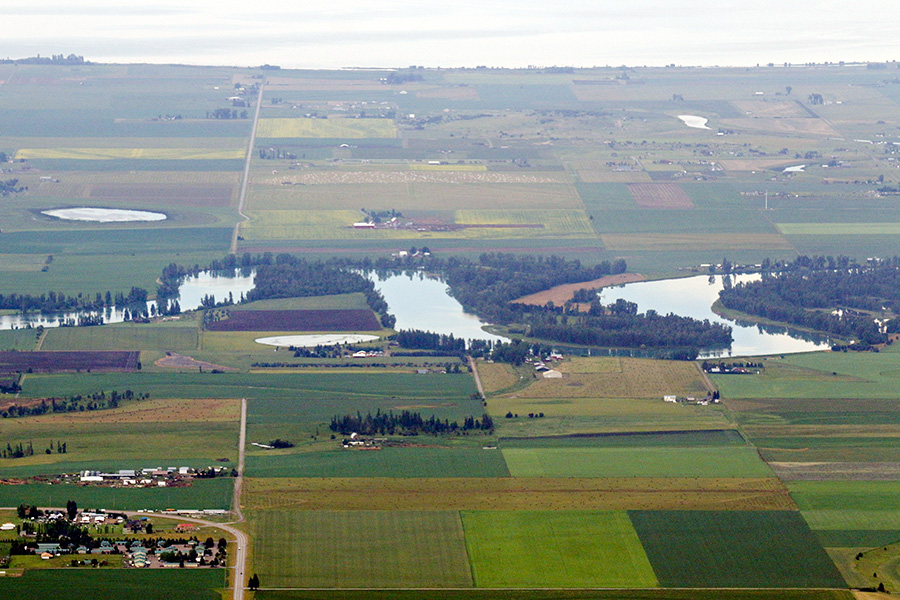A Flathead County District Court judge has asked for additional information before issuing a determination in a lawsuit filed by opponents of a water-bottling plant in Creston, refusing to shut down the plant until attorneys on both sides submit additional briefing in the matter.
The lawsuit — filed by the Egan Slough Community, Yes! For Flathead Farms and Water, and Amy Waller — was filed in Flathead County District Court on Sept. 7 against the Flathead County Commission, the Flathead County Planning Department, the Flathead City-County Health Department, and the Montana Artesian Water Company.
At a hearing on Sept. 25, Judge Robert B. Allison said from the outset that he would not be issuing a ruling due to having not had time to review the defendants’ briefs in opposition to the plaintiffs’ application for a writ of mandamus, or a court order instructing a government entity to fulfill its official duties.
The judge ordered the plaintiffs to file their reply brief by Nov. 9, and instructed all parties to file post-hearing briefs by Nov. 19.
Controversy over the Montana Artesian Water Company began as soon as the company’s owner, Creston landowner Lew Weaver, applied for permits from the state Department of Environmental Quality and the Department of Natural Resources and Conservation.
Weaver received a permit with the Department of Natural Resources and Conservation that would allow his company to produce up to 140,000 water bottles per hour, 24 hours a day, seven days a week. The water right would allow Weaver’s company to receive 710 acre feet of water annually, equaling roughly 1.2 billion 20-ounce water bottles.
Opponents to the water-bottling facility have pushed back against the project at public hearings in front of the commission, through legal channels, and eventually, in 2016, asking the county commission to expand the Egan Slough Zoning District, which protects the land’s agricultural character. The zone also prohibits most industrial uses.
The commission rejected that expansion request, and landowners followed up with a lawsuit — in which a judge determined in March that the county’s denial of the zoning petition was an abuse of discretion — and a ballot initiative for the June 5 election. Voters passed the initiative to expand the zoning district with 70 percent of the vote.
The change added 530 acres to the existing 1,150 acres in the zone. The new acreage includes Weaver’s facility, which, under the zoning district, is in violation of the district’s regulations.
But in a previous interview, Darryl James, a spokesman for Montana Artesian Water Company, said production had begun prior to the certification of the ballot initiative, including the assembly of equipment and the receipt of regulatory permits, thus making it a grandfathered-in company.
MAWC began producing and filling water bottles this summer. The latest lawsuit accuses the county commission of failing to enforce zoning regulations, which will affect property values. Waller, one of the plaintiffs in the case, farms her property near Egan Slough and said her “property, and her property values, are and will be severely and adversely affected by the operation of the water bottling plant,” the lawsuit states.
The lawsuit contends that the production plant’s operations were not grandfathered in, because the health department signed off on an updated Food Manufacturing License for the plant on June 22, one day after the election was certified.
“Prior to that date, MAWC could not legally operate, and had not operated,” the lawsuit states.
Over the summer, a code compliance officer from the planning and zoning department inspected the plant and said that MAWC was bottling water and filling orders in July. The company received its Retail Food License from the health department on July 17.
The lawsuit states that the compliance officer informed the county attorney’s office that Weaver “did not believe the plant was in a zoned area as the commissioners have not taken any formal action regarding the ballot initiative at this time … Mr. Weaver did state that if the County Attorney asked him to stop bottling operations, he would do so.”
The lawsuit also alleges that Flathead County has not fully responded to public records requests.
Should the judge agree with them, the plaintiffs seek for the county to enforce its zoning regulations against MAWC; for the county to take back the licenses issued by the health department; and to declare that the water company is in violation of the zoning district.
